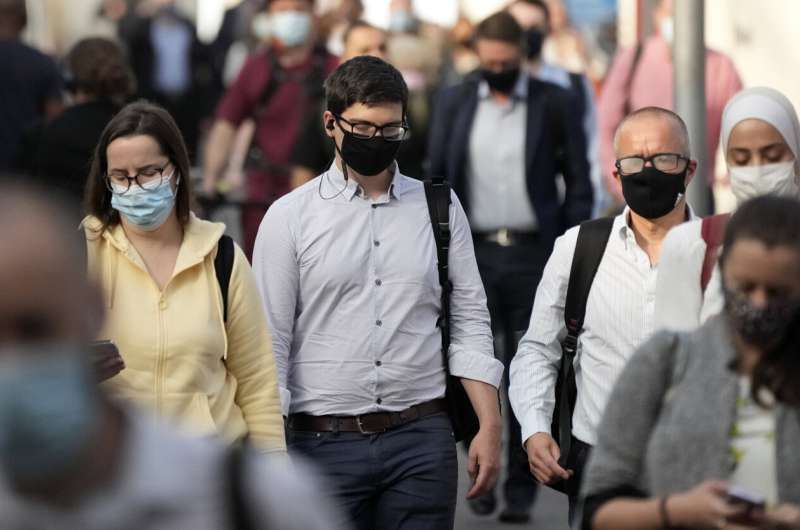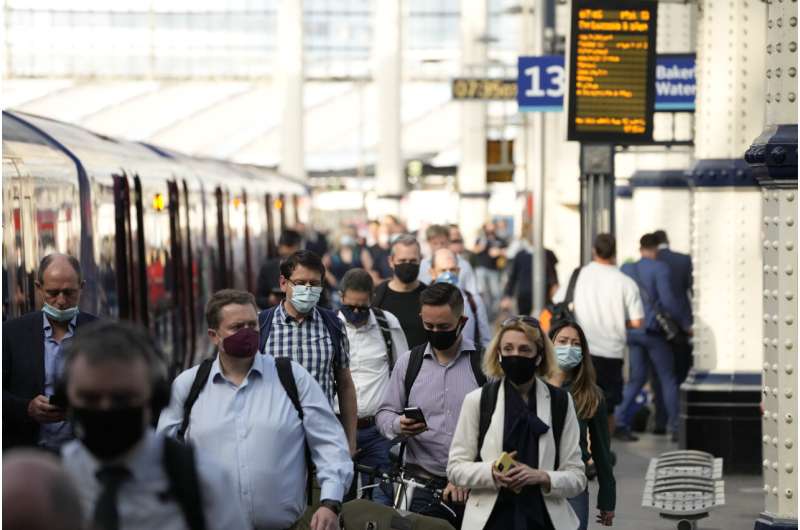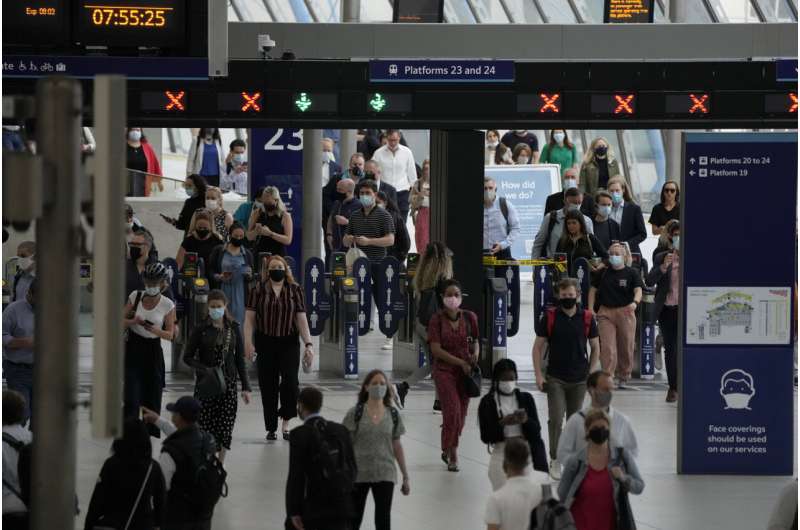People wear face masks to curb the spread of coronavirus during the morning rush hour at Waterloo train station in London, Wednesday, July 14, 2021. Britain is bracing for acrimony on Monday, July 19 when the government lifts a legal requirement to wear face coverings in most indoor settings, including shops, trains, buses and subways. Donning a mask in many places will stop being an order and become a request. Credit: AP Photo/Matt Dunham
The British government's top medical adviser has warned that the number of people hospitalized with the coronavirus could reach "quite scary" levels within weeks as cases soar as a result of the more contagious delta variant and the lifting of lockdown restrictions.
Chief Medical Officer Chris Whitty told a webinar hosted by London's Science Museum late Thursday that the U.K. is "not out of the woods yet."
"I don't think we should underestimate the fact that we could get into trouble again surprisingly fast," Whitty said.
New coronavirus infections in the U.K. are at a six-month high, according to government figures, and the number of people hospitalized and dying with COVID-19 are at their highest levels since March. Thursday's data showed 3,786 people in hospital with COVID-19 and another 63 virus-related deaths.
At the height of the second wave earlier this year, around 40,000 people were in hospital with COVID-19 and deaths reached around 1,500 people a day.
Another 48,553 confirmed lab cases were reported Thursday, the biggest daily figure since Jan. 15. The government has warned that daily infections could hit 100,000 this summer, a level not previously reached during the pandemic, with most of the new cases being seen among younger age groups, many of whom have yet to be vaccinated.
People wear face masks to curb the spread of coronavirus as they disembark from a train during the morning rush hour at Waterloo train station in London, Wednesday, July 14, 2021. London Mayor Sadiq Khan has asked Transport for London to enforce the use of mask wearing on buses and trains as a "condition of carriage", even after legal restrictions in England are lifted on July 19. Khan said he was "not prepared" to put tube, tram and other transport users in the capital "at risk" by removing the rules on face coverings. Credit: AP Photo/Matt Dunham
The British government, which is lifting all remaining legal restrictions on social gatherings in England on Monday, is hoping that the rapid rollout of vaccines will keep a lid on the number of people becoming seriously ill.
More than two-thirds of British adults have received both doses of a vaccine, and almost 88% have had one dose.
More cases will inevitably lead to more people requiring hospital attention even though the vaccine rollout has helped build a wall of immunity around those deemed to be the most vulnerable to disease.
Whitty warned that the number of people in hospital with COVID-19 is doubling about every three weeks and could reach "quite scary numbers" if the trend continues.
"We are not by any means out of the woods yet on this, we are in much better shape due to the vaccine program, and drugs and a variety of other things," he said.
People wears face masks to curb the spread of coronavirus after disembarking from trains during the morning rush hour at Waterloo train station in London, Wednesday, July 14, 2021. London Mayor Sadiq Khan has asked Transport for London to enforce the use of mask wearing on buses and trains as a "condition of carriage", even after legal restrictions in England are lifted on July 19. Khan said he was "not prepared" to put tube, tram and other transport users in the capital "at risk" by removing the rules on face coverings. Credit: AP Photo/Matt Dunham
"But this has got a long way to run in the U.K., and it's got even further to run globally," he added.
The surge in infections has had a knock-on effect in the number of people self-isolating after coming into contact with a confirmed coronavirus case. More than 500,000 people were contacted by the National Health Service's app and told to self-isolate in the seven days to July 7.
Businesses including automakers, meat processors and hospitality venues have reported staff shortages because so many employees have been told to quarantine by the app.
The government has expressed concerns about scale of the problem and are examining whether the app could be made less sensitive to reduce the numbers being pinged.
© 2021 The Associated Press. All rights reserved. This material may not be published, broadcast, rewritten or redistributed without permission.


























